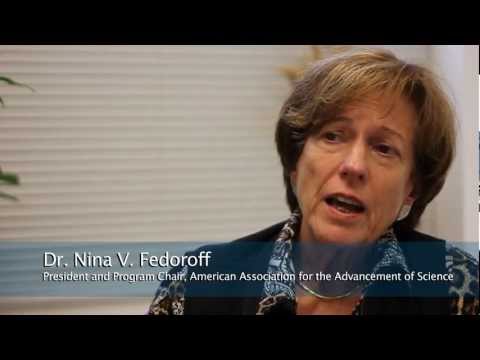
Nina Fedoroff, PhD, is one of the most influential scientists advocating for the proliferation and deregulation of genetically engineered foods. As president and board chair of the American Association for the Advancement of Science (AAAS) from 2011-2013, she used her position to advance policy objectives of the pesticide and biotechnology industries.
In 2015, Dr. Fedoroff became a senior science advisor at OFW Law, a lobbying firm whose clients have included Syngenta and the Council for Biotechnology Information, a trade group representing the world’s largest pesticide companies.
From 2007-2010, Dr. Fedoroff served as science and technology advisor to the Secretary of State and the Administrator of USAID under the George W. Bush and Obama administrations. Prior to that, she was a board member of the Sigma-Aldrich Corporation, a multinational chemical and biotech firm; and an advisory board member of Evogene, a biotechnology company that partnered with DuPont, Syngenta, Bayer and Monsanto.
As Secretary of State Hillary Clinton’s “science czar,” Dr. Fedoroff served as diplomat for the “GMO all the way ” thrust of U.S. foreign policy, Tom Philpott reported in Grist. Pesticide Action Network of North America has described Dr. Fedoroff as “literally the U.S. ambassador” for genetic engineering. According to Greenpeace, Dr. Fedoroff has been “a fervent advocate for the global proliferation of GM (genetically modified) foods throughout her career.”
During her tenure as president and chairman of AAAS, the world’s largest multidisciplinary scientific society, Dr. Fedoroff leveraged those roles to provide political aid to the agrichemical industry: for example, the AAAS Board of Directors under her chairmanship issued a statement to oppose GMO labeling in advance of a state vote on the issue in 2012. While president of the AAAS in 2011, Dr. Fedoroff helped defeat a U.S. EPA proposal that would have required additional health and safety data for GMO crops, according to emails described below. Dr. Fedoroff and AAAS have not responded to requests for comment.
Affiliations with deceptive industry front groups and PR efforts
Dr. Fedoroff has promoted and helped to legitimize groups that claim to be independent voices for science but work behind the scenes with the agrichemical industry in ways that mislead the public − including two groups that helped Monsanto try to discredit the scientists who served on the World Health Organization’s International Agency for Research on Cancer (IARC) expert panel that classified glyphosate as a probable human carcinogen in 2015.
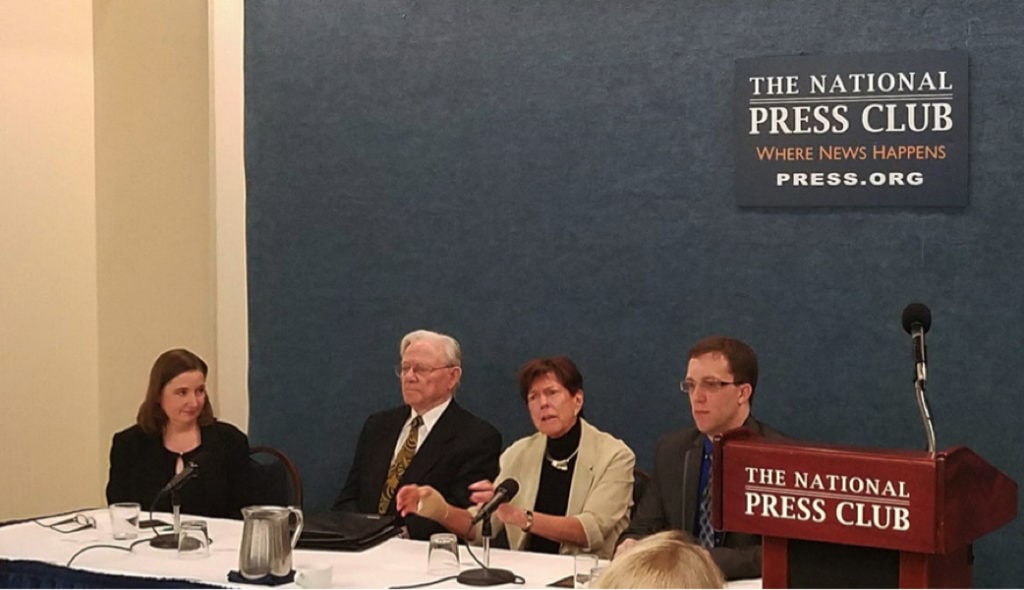
A 2017 event topromote the American Council on Science and Health’s “junk science” book featured Dr. Fedoroff andtwo scientists affiliated with groups that deny climate science.
American Council on Science and Health (ACSH) is a front group funded by chemical, pharmaceutical and tobacco companies, according to leaked internal documents that illustrate how ACSH pitches its services to corporations for product-defense campaigns. Emails released via court proceedings show that Monsanto agreed to fund ACSH in 2015 to help the company defend against cancer concerns linked to glyphosate-based Roundup weed killers.
Dr. Fedoroff helped promote this group as a legitimate science source in a 2017 National Press Club event to launch the ACSH’s “Little Black Book of Junk Science.”Appearing alongside Dr. Fedoroff at the press event were two scientists affiliated with groups that deny climate science and lobby for tobacco products:
- Angela Logomasini, PhD, is a senior fellow at the Koch-funded Independent Women’s Forum and Competitive Enterprise Institute. She argues that the large body of scientific evidence linking chlopyrifos to brain damage in children is “junk science.”
- Alan Moghissi, PhD, a former EPA official, supports several organizations that question man-made climatechange. He served on the advisory board of The Advancement of Sound Science Coalition (TASSC), a Philip Morris front group that tried to discredit research about the health harms of tobacco.
Genetic Literacy Project: Dr. Fedoroff is listed as a board member on the website of the Genetic Literacy Project, a group that claimed to be independent while, for years, partnering with Monsanto on product-defense projects (the group now discloses funding from Bayer).
Documents released in court filings show that Monsanto listed Genetic Literacy Project among the “industry partners” it counted on to “orchestrate outcry” against World Health Organization’s cancer research panel report listing glyphosate as a probable Hunan carcinogen. Genetic Literacy Project has posted dozens of attack articles about the cancer research agency, including posts accusing leading scientists of conspiracy, fraud, lying and corruption.
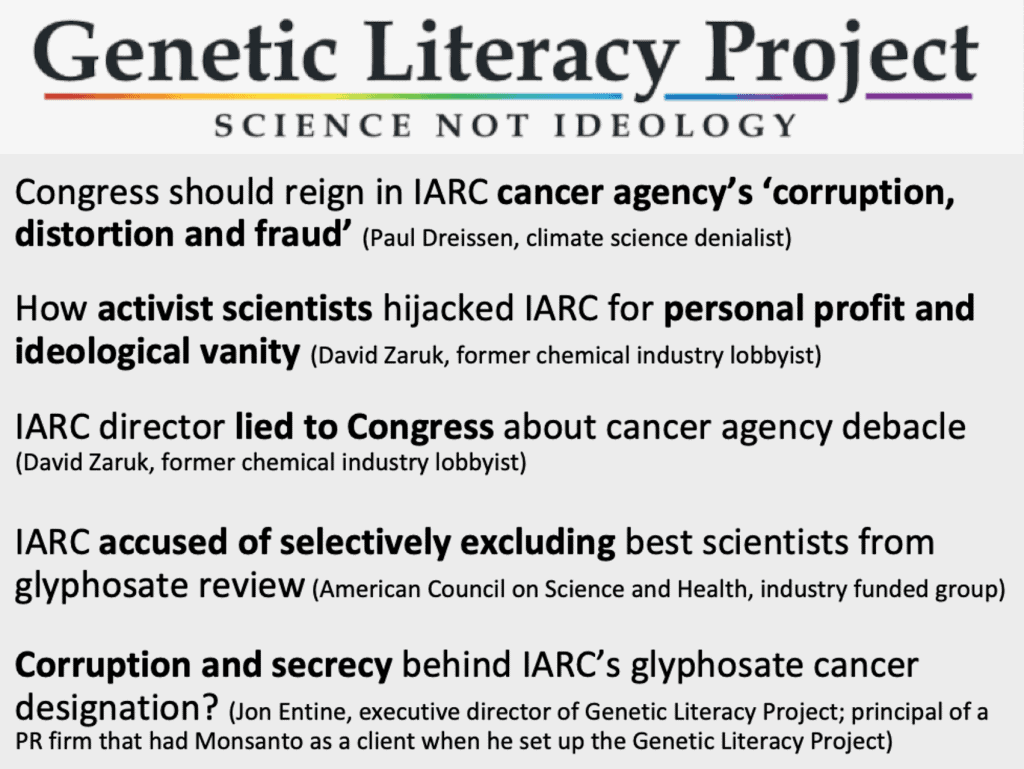
Academics Review: Dr. Fedoroff promoted Academics Review as a trustworthy science source in a 2012 article in Trends in Genetics and a 2016 interview with the Washington Examiner about poor science journalism. Documents obtained by U.S. Right to Know show that Academics Review was set up as a front group with the help of Monsanto to discredit critics of genetic engineering and pesticides, while keeping corporate fingerprints hidden.The group, which claimed to be independent but was funded by agrichemical companies, attacked the organic industry as a “marketing scam.”
Biotech Literacy Boot Camp: Dr. Fedoroff was listed as a core faculty member of a Biotech Literacy Project “boot camp” held at UC Davis in 2015. The event was organized by two PR groups, Genetic Literacy Project and Academics Review, and secretly funded by pesticide companies. The purpose of the events was to “train scientists and journalists to frame the debate over GMOs and the toxicity of glyphosate,” reported Paul Thacker in The Progressive.
AgBioWorld: In her 2012 Trends and Genetics article, Dr. Fedoroff promoted the website AgBioWorld as “another invaluable resource” to learn about science. In a 2002 article in the Guardian, George Monbiot described how Monsanto’s PR team used the AgBioWorld website and fake social media accounts to discredit scientists and environmentalists who raised concerns about GM crops, Monbiot reported: “At the end of last year, Jay Byrne, formerly [Monsanto’s] director of internet outreach, explained to a number of other firms the tactics he had used at Monsanto. He showed how, before he got to work, the top GM sites listed by an internet search engine were all critical of the technology. Following his intervention, the top sites were all supportive ones (four of them established by Monsanto’s PR firm Bivings). He told them to ‘think of the internet as a weapon on the table. Either you pick it up or your competitor does, but somebody is going to get killed.'”
Attack on Greenpeace: Dr. Fedoroff spoke at a 2016 press event for a group calling itself “Support Precision Agriculture,” which presented a letter signed by over 100 Nobel laureates criticizing Greenpeace for their opposition to GMOs. Pesticide industry allies helped organize the event,, including Monsanto’s former Communications Director Jay Byrne; former biotech trade group executive Val Giddings; and Matt Winkler, who funds the PR group Genetic Literacy Project and is listed as a board member along with Dr. Fedoroff on the group’s website.
The .com version of the supposedly independent “Support Precision Agriculture” website redirected to the Genetic Literacy Project for years (it was delinked after we called attention to it in 2019). In emails from 2011, Byrne identified Greenpeace on a “targets” list he was developing for Monsanto with names of industry critics they could confront from behind the cover of an industry-funded academic group that appeared independent.
Friend of GMO Answers: Dr. Fedoroff is an independent expert for GMO Answers, a PR campaign developed by Ketchum public relations, which has a history of using deceptive tactics to influence the public. Although Ketchum claimed the GMO Answers campaign would “redefine transparency,” the group scripted answers for an “independent” expert. The group also appears in Monsanto’s PR plans to protect its products and discredit critics, including scientists and journalists.
Opposed investigation to uncover industry-academic ties
In 2015, Dr. Fedoroff and two other former AAAS presidents, Peter Raven and Phillip Sharp, touted their AAAS leadership roles, but failed to disclose any of their industry ties, in a Guardian op-ed opposing a public records investigation that sought to uncover undisclosed partnerships and financial arrangements between pesticide companies, their PR groups and publicly funded professors.The investigation by U.S. Right to Know uncovered some of the key documents described in this fact sheet.
Although the Guardian later added a disclosure that Dr. Fedoroff works at the lobby firm OFW Law, it did not disclose that OFW Law’s client at the time was the agrichemical industry trade group, whose member companies were a focus of the public records investigation. The former AAAS presidents argued in their op-ed that the investigation to uncover undisclosed industry-academic conflicts of interest was “taking a page out of the Climategate playbook” and involved “science denialism” — the same claims made by industry PR groups described in this fact sheet.
AAAS helped persuade voters to oppose GMO labeling
In 2012, the AAAS Board of Directors under Dr. Fedoroff’s chairmanship took the unusual step of taking a position on a contentious political issue just two weeks before voters in California went to the polls to decide on Proposition 37, a ballot initiative to label GMOs.A review of the many political statements made by AAAS found no other examples of the organization attempting to influence voters ahead of a state election. (The AAAS and Dr. Fedoroff did not respond to requests for comment. Also disclosure: the USRTK co-directors worked on the pro-labeling campaign.)
The AAAS board’s statement opposing GMO labeling was controversial. It contained inaccuracies, according to longtime AAAS members, several of whom denounced the anti-labeling statement as a “paternalistic” attack on consumer rights that misled the public by omitting important scientific and regulatory context. An AAAS spokeswoman at the time, Ginger Pinholster, called the criticisms “unfair and without merit.” She told a reporter she was in the room when the board passed the statement: “We are not an advocacy group. We make our statements based on scientific evidence,” Pinholster said.”I can tell you that our statement is not the work of nor was it influenced by any outside organization.”
Some observers noted the similarities in language used by the AAAS and the industry-funded campaign to defeat Proposition 37.” Is a major science group stumping for Monsanto?” Michele Simon asked in Grist. Simon described the board’s statement as “non-scientific but very quote-worthy,” and noted that the accompanying AAAS press release contained “talking points” that matched No on 37 campaign literature.
“appearing to be less than transparent is a really bad idea for the scientific community”
In a 2013 letter to Science magazine, another group of 11 scientists raised concerns that the AAAS board’s statement on GMO foods “could backfire.” They wrote, “we are concerned that AAA’s position represents a poorly informed approach to communicating science … appearing to be less than transparent is a really bad idea for the scientific community.”
Dr. Fedoroff was an early supporter of the industry-backedNo on 37 campaign, which listed her on its website in June 2012 as one of four scientists representing the “scientific and academic community” who opposed GMO labeling. The campaign later asked Dr. Fedoroff to help recruit more academics to their cause, which she did according to an October 1, 2012 email to Meghan Callahan of BCF Public Affairs, “I’ve forwarded your [request for academic supporters] to an international group of biotechnology supporting academics. I suspect you’ll be hearing from many corners of the world,” Dr. Fedoroff wrote.
Helped kill data requirements for pesticide-producing plants
In 2011 while serving as AAAS president, Dr. Fedoroff worked with agrichemical industry allies and an industry lobbyist to stop the U.S. Environmental Protection Agency from requiring companies to provide additional health and safety data for genetically engineered foods that are classified as pesticides, according to emails described below.
The EPA proposal stemmed from a 2009 EPA Scientific Advisory Panel discussion about ways to improve the agency’s ability to make regulatory decisions about plants that are genetically engineered to produce or contain pesticides, which EPA refers to as “plant-incorporated protectants” (PIPs). Panel members were asked to evaluate current and proposed EPA data requirements for PIPs in the following areas:
- data to assess potential similarities between PIPs and allergens, toxins, anti-nutrients and other hazardous proteins;
- testing for synergistic effects on health and non-target organisms, when two or more GMO traits are combined (stacked trait GMOs);
- potential impacts on microbial populations in soil ecosystems; and
- data to better address the impacts of gene flow.
According to notes from an October 2009 EPA meeting, the proposed rules would “mostly codify existing data requirements that are currently applied on a case-by-case basis,” and would encompass five categories of data and information: product characterization, human health, non-target effects, environmental fate and resistance management. EPA announced the proposed rules in the Federal Register in March 2011.
Emails obtained by U.S. Right to Know via public records requests show how industry allies mobilized to defeat the proposal.
The emails show conversations between Bruce Chassy, a University of Illinois professor at the time, Eric Sachs of Monsanto and other industry reps discussing activities and meetings that involved Dr. Fedoroff.Chassydescribed himself in the emails ( page 66) as the liaison between industry and academics in the effort to oppose the EPA data requirements. Interspersed in his emails to Sachs were queries about whether Monsanto had sent a check to the University of Illinois Foundation in support of Chassy’s “biotechnology outreach and education activities.” (For more details about the undisclosed funds Chassy received from Monsanto for years as he promoted biotechnology, see reporting by Monica Engin WBEZ and emails posted by the New York Times.)
On July 5, Dr. Chassy emailed Eric Sachs of Monsanto to report thatDr. Fedoroff had sent a letter to EPA over her signature co-signed by 60 members of the National Academy of Sciences.”Nina really picked up the ball and moved it down the field,” Chassy wrote. He described the EPA proposal as a “train wreck.”
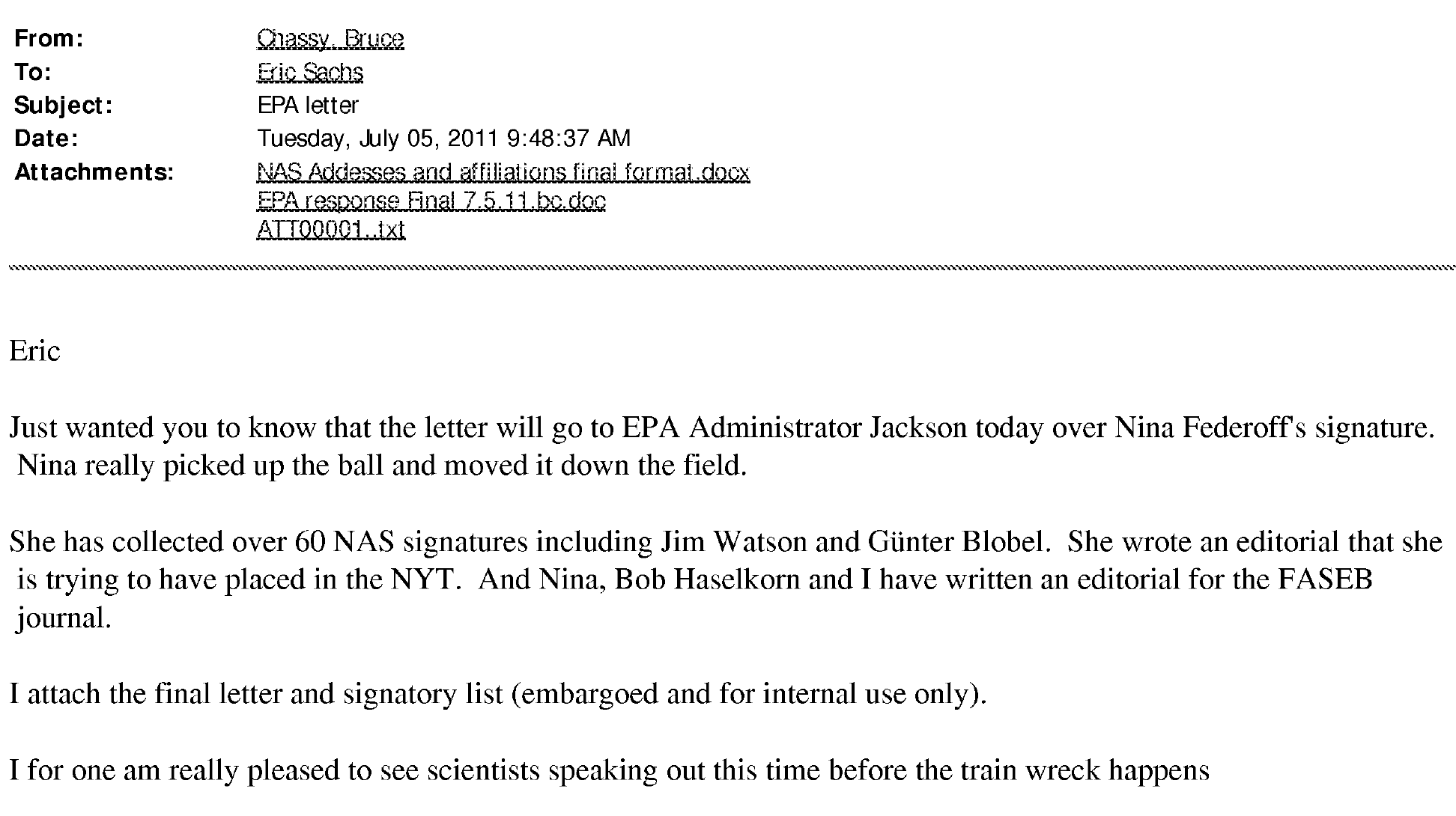
_____
The emails show that on August 19, industry trade group representatives were surprised and pleased (page 19) to see a New York Times op-ed fromDr. Fedoroff arguing against regulations for genetic engineering; “who got Nina’s op ed placed?” Adrienne Massey of BIO asked Dr. Chassy and two other industry allies, Henry Miller and Val Giddings. Chassy responded:
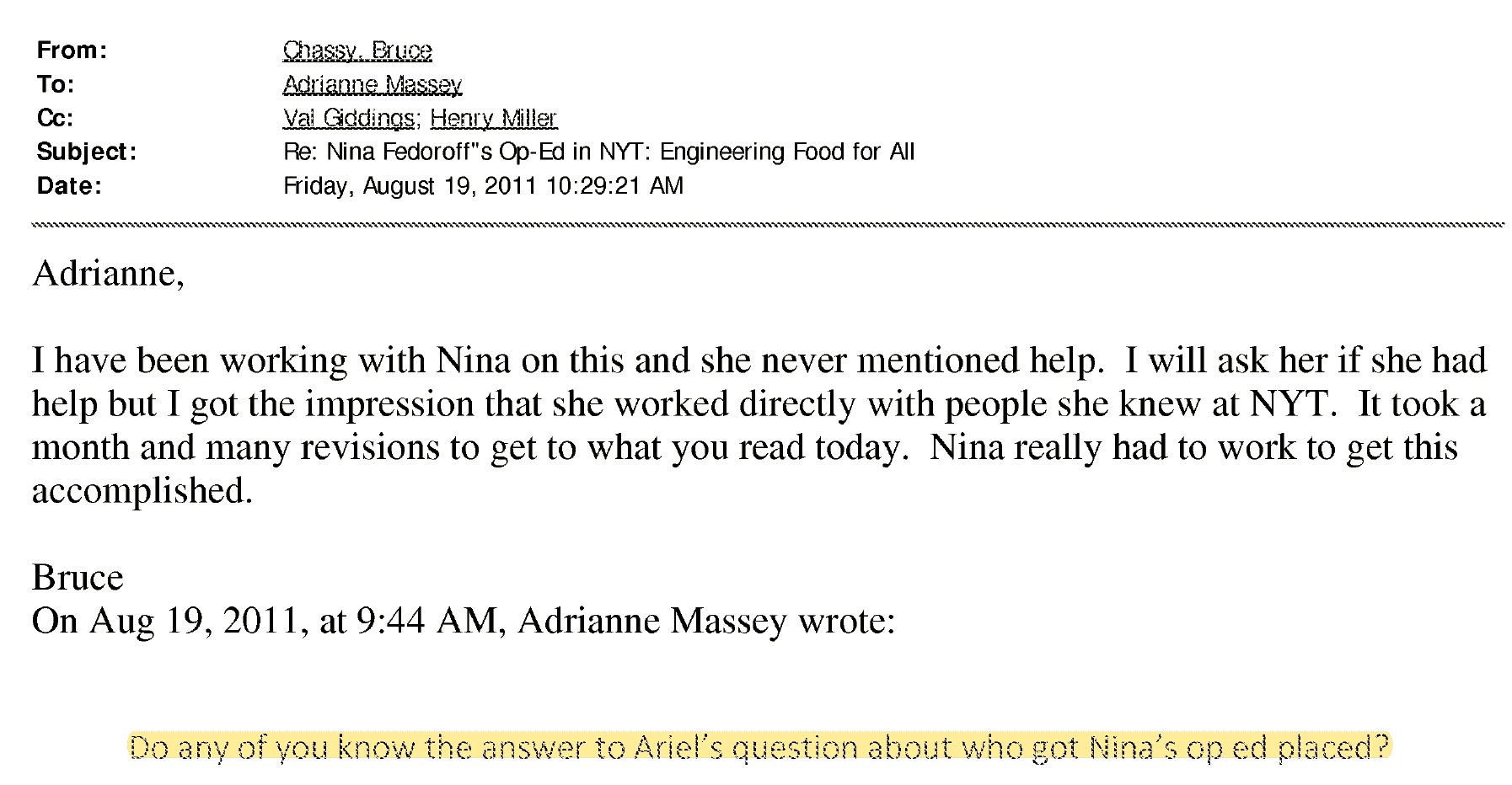
_____
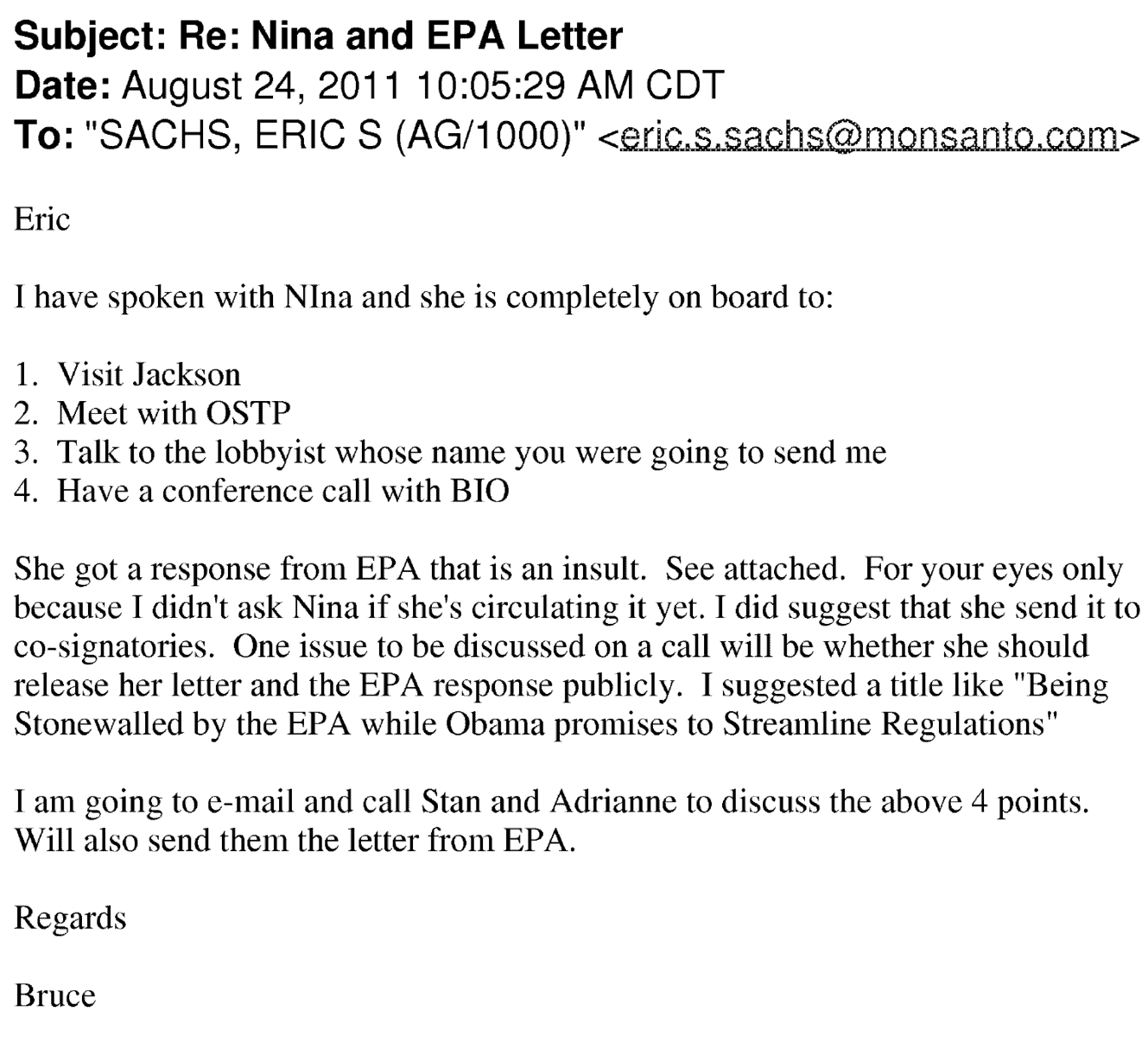
Massey forwarded Dr. Chassy the letter BIO sent to the EPA “hoping to build on the academics’ letter and short-circuit any dismissive response of EPA to that letter.” Their efforts did not succeed as they hoped. On August 24, Dr. Chassy wrote to Eric Sachs (page 14) that Dr. Fedoroff “got a response from EPA that is an insult.” He described plans to ratchet up the pressure.
_____
In September, Chassy organized a conference call with Fedoroff, Monsanto’s Eric Sachs, Adrienne Massey of BIO and their lobbyist Stanley Abramson, among others. According to Chassy’s notes from the call, “Finding a way to ensure that the EPA proposal never sees the light of day would be the best possible outcome we could hope for. Next best would be to make sure it is DOA, but if needs be we must be willing to continue the fight.”
He also shared the problem that, “The EPA does not believe that the academic community can mount a sustained opposition to their proposed rule making; they believe that only a small handful are behind the petition and that most of the signatories are not committed to the issue.” The group decided they needed to “build a core of leading scientists who are in fact willing to speak out and devote time to this issue.”
By October, the group was more hopeful. Chassy emailed Sachs to report on a “surprisingly productive” meeting he and Dr. Fedoroff attended with Steve Bradbury of EPA. The meeting had been set up by Massey and the lobbyist Abramson. The EPA proposal to require data for GMO PIPs never did see the light of day, according to Michael Hansen, PhD, senior scientist at Consumers Union, who participated in the public meetings with the agency.
Full email chains, via the UCSF Industry Documents Library:
Related reporting
“ I Was Barred from a Nobel Laureate Press Conference by a PR Consultant with Monsanto Ties,” by Tim Schwab, Food & Water Watch (2016)
“ The Puppetmasters of Academia,” by Jonathan Latham, PhD, Independent Science News (2015)
“ 20 years later: the biotech brigade marches on,” Pesticide Action Network (2012)
“ Engineering food for whom?” by Marcia Ishii-Eitemann, PhD, senior scientist at Pesticide Action Network North America (2011)
“ Sorry, NY Times: GMOs still won’t save the world,” by Anna Lappe, Grist (2011)
“ In which I go toe to toe with H. Clinton’s science czar over GMOs,” by Tom Philpott, Grist (2009)
“ Genetically Modified Diplomat: U.S. Foreign Policy GMO All the Way,” by Tom Philpott, Grist (2008)









